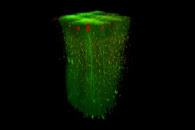|
| | Neurology / Neuroscience | |
| | The latest neurology news from News Medical | |
|
|
 |
| |  Function and Characteristics of Astrocytes in Disease and Development Function and Characteristics of Astrocytes in Disease and Development
Astrocytes support the trophic and metabolic development of neurons. As they mature, these cells have a broad range of functions in myelination, neuronal migration and synaptogenesis. The study of astrocytes using in vitro co-culture models is becoming more important in neuroscience research.
| |
|
|
|
|
 |
| | Detecting Brain Disease Using the Eye  The human eye shares several vascular and neural similarities to the brain, and hence, our eyes have been found to offer a direct window to brain pathology. The unique characteristics of our eyes allow them to be a relatively affordable biomarker for Alzheimer's disease (AD) and other illnesses of the brain. The human eye shares several vascular and neural similarities to the brain, and hence, our eyes have been found to offer a direct window to brain pathology. The unique characteristics of our eyes allow them to be a relatively affordable biomarker for Alzheimer's disease (AD) and other illnesses of the brain. | |
|
| | Cluster Headaches: Treatment and Prevention  Cluster headache is one of the most painful conditions a person can experience, and women who experience it sometimes refer to the pain as more intense than childbirth. Around 1 to 2 in 1,000 people experience cluster headaches. They can affect anyone, but they are more common among men and usually start in the third or fourth decade of life. The condition can be lifelong, but pain-free periods between the clusters tend to become longer as a person ages. Cluster headache is one of the most painful conditions a person can experience, and women who experience it sometimes refer to the pain as more intense than childbirth. Around 1 to 2 in 1,000 people experience cluster headaches. They can affect anyone, but they are more common among men and usually start in the third or fourth decade of life. The condition can be lifelong, but pain-free periods between the clusters tend to become longer as a person ages. | |
|
| | Reducing the gender gap and saving the future workforce of neurology  Allison Brashear, Dean of the UC Davis School of Medicine, is working to save the future workforce of neurology and to reduce the gender gap in the medical specialty. Allison Brashear, Dean of the UC Davis School of Medicine, is working to save the future workforce of neurology and to reduce the gender gap in the medical specialty. | |
|
| | Swimming a 'no-no' for those undergoing deep brain stimulation therapy  Researchers have found that persons who have had a deep brain stimulation device implanted for treatment of Parkinson’s disease may have lost their ability to swim. The small study was titled, “Beware of deep water after subthalamic deep brain stimulation,” and was published in the latest issue of Neurology this week. Researchers have found that persons who have had a deep brain stimulation device implanted for treatment of Parkinson’s disease may have lost their ability to swim. The small study was titled, “Beware of deep water after subthalamic deep brain stimulation,” and was published in the latest issue of Neurology this week. | |
|
|
|
|










































No hay comentarios:
Publicar un comentario